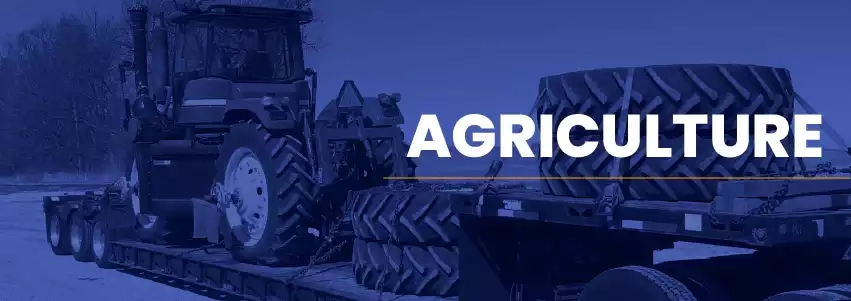List of Agricultural Transporters in OPCA
The agriculture industry is an essential sector in many regions, particularly in Southeast Europe, where it contributes significantly to national GDPs. However, agriculture faces various challenges, such as an aging workforce, lagging digitalization, and slow productivity growth. One crucial factor in overcoming these challenges is the ability to move agricultural equipment efficiently across borders. This is where agri transporter services and project cargo freight forwarders play a pivotal role, offering comprehensive logistics solutions for the transportation of agricultural machinery and equipment via air freight, sea freight, land freight, and rail freight.
OPCA's project freight forwarders directory provides not only the agriculture transport professionals but also other freight forwarders with the opportunity to make an informed choice based on their needs and suitable solutions for the agricultural equipment transport.
The Role of Project Cargo Freight Forwarders in Agriculture
Project cargo freight forwarders specialize in handling large, heavy, and complex shipments across various industries, including agriculture. These freight forwarders coordinate and manage the movement of oversized and high-value agricultural machinery transport services, such as tractors, combine harvesters, forage harvesters, cotton pickers, sprayers, and other essential equipment, across international borders.
OPCA members' expertise in managing project cargo logistics ensures that agricultural equipment is transported safely, efficiently, and cost-effectively. The role of project cargo freight forwarders in agriculture is redefined with OPCA members, as they are carefully selected based on their solid expertise and proven track record.
With the agricultural industry relying heavily on mechanization, the demand for agricultural equipment continues to rise. The shipment of large farming machinery presents unique challenges, from complex regulations to high transportation costs. However, international freight forwarders can mitigate these challenges through specialized logistics services that streamline the process, ensuring that equipment reaches its destination on time and within budget.
Seamless Logistics Solutions Across Multiple Shipping Modes
Project cargo freight forwarders provide integrated logistics solutions that encompass all forms of transportation, including air freight, sea freight, land freight, and rail freight. Each shipping mode offers distinct advantages for different types of agricultural machinery.
Air Freight: For high-value or time-sensitive agricultural equipment, air freight provides the fastest delivery option. Although air freight handles a smaller percentage of global cargo volume, it is responsible for a significant share of cargo value. The need for speed, security, and reliability makes air freight an attractive option for shipping critical farming machinery that needs to reach its destination without delay.
Sea Freight: For bulk shipments of agricultural equipment, sea freight offers an economical solution, particularly for larger machinery that cannot be accommodated by air transport. International freight forwarders specializing in project cargo often arrange sea freight shipments for heavy-duty equipment such as combine harvesters, cotton pickers, and large tillage equipment. With vast global shipping networks, sea freight ensures cost-effective transportation across international waters.
Land Freight: When moving agricultural equipment overland, land freight becomes crucial for connecting ports or airports with rural areas where farming operations are located. Project cargo freight forwarders coordinate heavy machinery transport companies, ensuring that agricultural machinery is delivered safely and on time, whether it’s through standard land transport or specialized vehicles designed to handle oversized loads.
Rail Freight: In regions where rail infrastructure is well-developed, rail freight can serve as an efficient and eco-friendly solution for transporting agricultural equipment over long distances. With the growing trend toward sustainability, rail freight can be an environmentally friendly option, especially when transporting large quantities of equipment across countries or continents.
The Importance of Project Cargo Network in Agriculture
In Southeast Europe, the agriculture sector remains a significant employer, with agriculture accounting for 14% to 21% of employment in countries like Bulgaria, Serbia, and Romania. Despite these contributions, the sector faces challenges in adopting new technologies and expanding its operations. Efficient transportation of agricultural equipment is essential to support growth, improve productivity, and modernize farming practices.
Project cargo freight forwarders play a critical role in overcoming the logistical barriers that hinder agricultural development. By offering flexible and tailored solutions for shipping farming machinery, these international logistics experts ensure that agricultural businesses have access to the tools they need for increased productivity. Furthermore, as the agricultural sector increasingly embraces digital technologies such as IoT, drones, and precision farming tools, seamless logistics will be essential for maintaining a competitive edge in a rapidly evolving market.
Digitalization and the Future of Agricultural Logistics
As the agriculture industry in Southeast Europe works to embrace digitalization and new farming technologies, the logistics sector, particularly project cargo freight forwarders, must adapt. Many challenges exist, including rural connectivity issues that hinder the adoption of IoT and precision farming tools. However, the integration of digital solutions into logistics operations offers significant opportunities to streamline the transport of agricultural equipment.
From tracking shipments in real-time to optimizing routes for efficiency, digital tools are revolutionizing the way project cargo is handled. This trend is especially important for the agriculture sector, where timely delivery and equipment availability can significantly impact productivity and profitability.
OPCA Role In Connection Between Freight Forwarders and Agriculture Industry
The connection between project cargo freight forwarders and the agriculture industry is undeniable. As the demand for agricultural machinery grows, efficient logistics solutions are more critical than ever. International freight forwarders specializing in project cargo provide tailored services across air freight, sea freight, land freight, and rail freight, ensuring that large agricultural equipment reaches its destination on time and in optimal condition.
With the agricultural sector facing challenges such as an aging workforce and digital adoption barriers, seamless logistics will continue to play a crucial role in facilitating growth and modernization. By partnering with experienced project cargo freight forwarders, farm equipment transport companies, agriculture transportation companies, and auto moving companies, agricultural businesses can ensure that they have the tools and equipment necessary to thrive in an increasingly interconnected and digital world.
Frequently Asked Questions (FAQs) About Agricultural Transporters
1. How can I track my agricultural equipment shipment?
Digital tools, such as GPS tracking and logistics management platforms, are used by freight forwarders to provide real-time updates. These tools offer visibility into the shipment's location, estimated time of arrival (ETA), and any delays. Customers can often access this information via online portals or mobile apps provided by the logistics company.
2. What types of agricultural equipment can be shipped internationally?
Agricultural equipment like tractors, combine harvesters, forage harvesters, sprayers, cotton pickers, windrowers, tillage equipment, and more can be shipped internationally. Due to their size, some equipment may require special handling, such as Roll On, Roll Off (Ro-Ro) shipping or custom out-of-gauge shipping solutions to ensure safe transport.
3. What are the typical costs associated with shipping agricultural equipment?
Costs are influenced by the dimensions and weight of the shipment, the shipping method (air, sea, land, or rail), distance, customs fees, and insurance. Additional services, such as disassembly, specialized packaging, and equipment assembly at the destination, can also increase costs. Seasonal variations, such as peak shipping seasons, and urgency, like expedited shipments, play a significant role. Freight forwarders can provide detailed cost breakdowns tailored to your shipment's needs.
4. How does Roll On, Roll Off (Ro-Ro) shipping work for agricultural equipment?
Roll On, Roll Off (Ro-Ro) shipping is ideal for self-propelled agricultural machinery, such as tractors and harvesters. This method allows the equipment to be driven directly onto the shipping vessel's deck, where it is securely secured for transport. It eliminates the need for containers and offers a cost-effective solution for large agricultural machinery shipments.
5. How is heavy or oversized agricultural machinery transported safely?
Heavy or oversized machinery is transported using specialized methods such as Ro-Ro (Roll-on/Roll-off) shipping for self-propelled equipment, flatbed or low-loader trucks for overland transport, and break-bulk or containerized shipping for sea freight. Rail freight may also be used in regions with suitable infrastructure. Secure handling involves proper loading techniques, lashing, and the use of protective materials to prevent damage during transit.
6. What documents are required for international agricultural shipping?
Key documents typically include invoices, bills of lading, customs declarations, and certificates of origin. Depending on the destination country and type of equipment, additional documents like phytosanitary certificates, export licenses, or CE compliance certificates may be required. Freight forwarders also assist with preparing and submitting these documents to ensure smooth customs clearance.
7. What steps should be taken to prepare agricultural equipment for shipping?
Preparing agricultural equipment for shipping involves a few key steps to protect it during transit:
- Drain any excess fuel or oil.
- Perform a basic safety check on the equipment.
- Securely package smaller components in crates and boxes to prevent rust and corrosion.
- Ensure that labels with important loading, unloading, and usage instructions are visible.
8. What are the common challenges in agricultural logistics and how can they be addressed?
Common challenges include high transportation costs, complex and varying regulations across countries, and digitalization barriers, especially in rural areas. Addressing these challenges requires a combination of flexible logistics planning, strategic use of multimodal transport options, and advanced tracking systems. Partnering with experienced freight forwarders ensures regulatory compliance and cost optimization while leveraging digital tools to improve transparency and efficiency.
9. How does OPCA members ensure a smooth shipping process for agricultural equipment?
OPCA members handle all aspects of the agricultural equipment shipping process to ensure a seamless experience.
The process includes:
- Providing shipment details and sending equipment specifications.
- Receiving a detailed quote.
- Overseeing the entire shipping process, from pickup to delivery.
- Managing customs clearance and final delivery. Their team of specialists ensures professional attention to every step, including route selection, shipment tracking, and reporting updates, offering transparent, competitive rates with no hidden fees.
_logo.webp)



